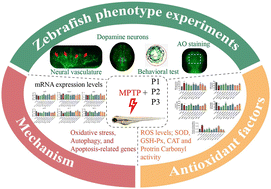The molecular mechanism of three novel peptides from C-phycocyanin alleviates MPTP-induced Parkinson's disease-like pathology in zebrafish†
Abstract
Previous studies have shown that peptides isolated from C-phycocyanin (C-PC) possess various functions including antioxidant and anticancer activities. However, there is little research on C-PC peptides applied for the neuroprotective effect against a 1-methyl-4-phenyl-1,2,3,6-tetrahydropyridine (MPTP)-induced Parkinson's disease (PD) model. In this study, twelve novel peptides from C-PC were isolated, purified and identified, and the anti-PD effect of the synthesized peptides was evaluated in a zebrafish PD model. As a result, three of these peptides (MAAAHR, MPQPPAK, and MTAAAR) significantly reversed the loss of dopamine neurons and cerebral vessels, and reduced the locomotor impairment in PD zebrafish. In addition, three novel peptides could inhibit the MPTP-induced decrease of antioxidant enzymes (SOD, CAT, and GSH-Px) and increase the ROS and protein carbonylation content. In addition, they can also alleviate apoptosis of brain regions and acetylcholinesterase (AChE) activity in zebrafish. Further studies elucidated the potential molecular mechanism of peptides’ anti-PD effects in the larvae. The results showed that C-PC peptides could modulate multiple genes associated with oxidative stress, autophagy and apoptosis signaling pathways, and thereby alleviate the occurrence of PD symptoms. Overall, our results highlight the neuroprotective effects of three novel peptides and provide valuable mechanistic insights and a promising drug target for the treatment of PD.



 Please wait while we load your content...
Please wait while we load your content...